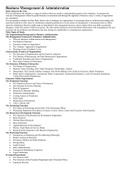Business Management & Administration
Main Aim(s) of the Unit:
The unit introduces the student to a range of studies which are useful in understanding people in the workplace. It examines the
concept of management within the global business environment and through the appraisal of business cases, a variety of approaches
are considered.
The unit prepares students for their likely future roles as managers in organisations. It encourages them to synthesize knowledge and
experience gained in other units by considering competing perspectives on the nature of management. It encourages them to reflect
upon the contribution that they might make as individuals to the management process, and to explore their own skills as potential
managers, within the context of their peer group. The unit touches practical, moral and ethical dimensions of the management role and
examines the key problems and dilemmas that may emerge for stakeholders in contemporary organisations.
Main Topics of Study:
The Organisational Background to Business Administration
The Management Framework to Business Administration
What are Business Administration and Management?
The Board of Directors
Functions within an Organisation
The ‘Systems’ Approach to Organisation
Planning-Control Feedback Cycles
Characteristic Features of Organisations
The Structure of Organisations and the Need for Authority
The Features of Bureaucratic and Non-Bureaucratic Organisations
Traditional Principles and Types of Organisation
More about Systems & Subsystems
The Structure of Business Enterprises
The Pattern of Organisations
Business Types including; Sole-Trder Enterprises, Partnerships, Limited
Partnerships, The Limited Liability Company, Non-Profit-Making Units (Clubs & Societies), Public Enterprises
Public Sector Organisations; Autonomous Public Corporations, Nationalised Industries, Local Government Institutions,
Central Government Departments
Functions within Organisations
The Production Function:
The Production Process and Types of Production
Site Selection & Factory Planning
Plant & Equipment
Materials & Materials Handling
Production Administration
Costing Aspects of Production
Work Study
Maintenance & Production
CAD, CAM & CIM
The Purchasing Function:
The Nature of Purchasing and the Role of the Purchasing Officer
Purchasing Department Procedures, Inventory Control, Stores Control and Economic Order Quantity
The Research & Development Function:
The Functions of the Research & Development Department
Basic Research
Problem-Based Research
Ideas Generation
Applied Research & Development
Patents, Trade Marks & Service Marks
Research & Development in the Business Organisation
The Marketing Function:
Introduction to Marketing and The Marketing Philosophy
Market Analysis & Research
Promotion, Publicity & Public Relations
Pricing Policy
Credit Control
Sales Administration
Transport & Distribution (Logistics)
Export Marketing
Personnel Department:
The Need for Staff
The Functions of the Personnel Department and a Personnel Policy
Employee Records
, Promotion, Transfer, Termination & Dismissal
The Administrative Officer’s Role
Industrial Relations Practice
The Remuneration of Staff
Office Administration:
The Role of the Administrative Officer
Facilities Management - The ‘New-Look’ Office Administrator
The Office & its Functions
The Clerical Function, Business Correspondence, Mail Inwards, Mail
Outwards, Systems for Producing Business Correspondence.
Meetings, Conferences, Functions and Delegation
Other Responsibilities of the Administrative Officer:
The Organisation & Methods Department
Security Aspects of Business
Risk Management
The Environment of Organisations
What is a Claimant?
Assessing the Impact of Claimants
Learning Outcomes for the Unit
On successful completion of this unit students will be able to:
1. Provide critical evaluation of the major functional areas of a business and describe their interrelationship.
2. Evaluate competing perspectives on the nature of management as both a function and process within organisations
3. Discuss the concept of managerial power and authority, in the context of the work of individual managers, and organisations
within their social and cultural contexts.
4. Discuss models of managerial decision-making
5. Discuss the development of organisations in their historical, social and cultural contexts, and the choices that this creates for
the management of organisations
6. Explain the process of organisational change and development.
7. Discuss management as a moral and ethical process
8. Demonstrate an appreciation of the role of the Administrator as part of the Managerial process
The numbers in the boxes below show which of the above unit learning outcomes are related to particular cognitive and key
skills.
Knowledge & Understanding 1-8
Analysis 1,2,4,7
Synthesis/Creativity 1,2
Evaluation 1,2,7,8
Interactive & Group Skills -
Self-appraisal/ Reflection on Practice -
Planning and Management of Learning -
Problem Solving 1,2
Communication & Presentation 1-8
Other skills (please specify): -
Learning and teaching methods/strategies used to enable the achievement of learning outcomes:
Learning takes place on a number of levels through lectures, class discussion including problem review and analysis. Formal lectures
provide a foundation of information on which the student builds through directed learning and self managed learning outside of the
class. The students are actively encouraged to form study groups to discuss course material which fosters a greater depth learning
experience.
Assessment methods which enable the student to demonstrate the learning outcomes for the Unit:
Examination: 3 hours duration 100%
Indicative Reading for this Unit:
Main text: Business Management & Administration - G Whitehead & G Whitehall (Institute of Commercial Management)
Alternative Texts and Further Reading:
Modern Business Administration - R C Appleby (Pitman)
The Structure of Business - M Buckley (Pitman)




